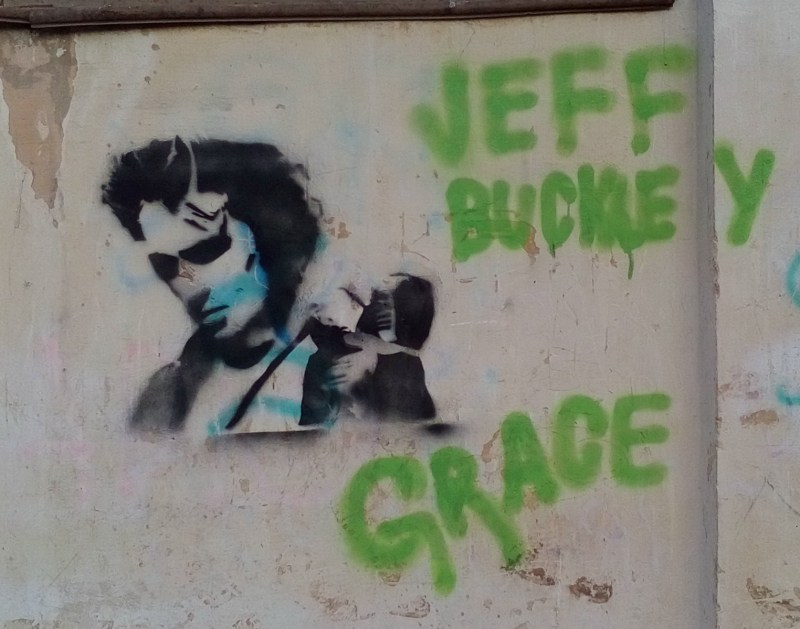2017 will mark the twentieth anniversary of the death of Jeff Buckley, whose only studio album, 1994’s “Grace,” is a sort of cult classic of the nineties I am grateful (and ashamed) to have only recently discovered.
Buckley made his name doing covers in coffeeshops in the Village, and his most popular song continues to be his cover of the late, great Leonard Cohen’s “Hallelujah.” He has a way of reimagining a song, making it almost sound like he wrote it, while still managing to do justice to the original recording and its appreciators. Buckley’s covers on “Grace” serve as periodic interludes to his originals – operatic, six-minute monoliths of complex texture and haunting melody. The format is atypical: Earlier singer-songwriters often segregated their covers into separate albums (e.g. Dylan’s underrated 1970 album “Self Portrait”). However, it makes sense: Buckley’s own songs provide such concentrated doses of heartbreak, pain, and ruthless introspection that it is a relief to have them interspersed with songs that, if no happier, at least provide a sense of distance between artist and material.
“Grace” has gained a kind of special significance in light of its author’s biography: Specifically, Buckley’s accidental drowning just three years after its release, during a desultory swim in the Mississippi River, victim of a passing tugboat’s wake. This lends a deathly credence to certain lines – to mention an obvious example, the line “I couldn’t awake from the nightmare / That sucked me in and pulled me under,” from his song “So Real.”
Buckley was thirty years old. His father, Tim Buckley, also a singer, had died at twenty-eight of a heroin overdose. Despite the fact that the two Buckleys met only once, when the younger was eight years old, there are clear parallels between the two men, including in their vocal styles. Both are marked by a remarkable range and ability to hold notes. They seem to use their voices as instruments that testify, more profoundly even than the words they sing, to a pain that is bottomless and inarticulable. Both men achieved only moderate commercial success during their lives (despite the younger Buckley’s Columbia contract) but have become highly regarded since their deaths, especially by critics and musicians. We can also note a subtle psychedelic quality in Jeff Buckley’s work, a tendency more overt in his father’s songbook.
It is hard not to read Jeff Buckley’s words on “Dream Brother” as a sort of Hamletian soliloquy, Buckley begging himself to hold onto life, unlike his father: “Don’t be like the one who left behind his name / ‘Cause they’re waiting for you like I waited for mine / And nobody ever came.” These lines demonstrate that even if Buckley could not free himself from his own existential pain he was deeply aware of his responsibilities on Earth, and of the more evitable pain he experienced from his own father’s abdication from his life. This was not something the younger Buckley wished on the people in his life.
“My body turns and yearns for a sleep that won’t ever come,” Buckley cries on “Lover, You Should’ve Come Over.” Should we allow ourselves to wonder if his drowning in the Mississippi – a death so romantic and American that the combined forces of Mark Twain and Walt Whitman couldn’t have imagined a better story – might not have been entirely accidental? Forensic and anecdotal evidence contradicts the idea of Buckley as Ophelia. The man’s life was looking up, he had felt reinvigorated as he dove into the brown Mississippi that day in late May with no trace of alcohol or narcotics in his body. How could he have seen coming that fateful passing tugboat? He drowned like the Athenian sailors at Arginusae, victorious and forsaken.
Though we will never know what Buckley thought of as he was sucked down, we might imagine him to have felt a sense of relief, or destiny, even as he struggled in vain towards the surface. In Hamlet’s words, “There is special providence in the fall of a sparrow.” We should be careful not to conflate the tragic ends of father and son, but it’s hard to deny that the Buckley family, like the Hemingway and the Buendía families, reminds us of the terrible potency of those ineluctable psychic maladies that are passed from father to son.
As a historical footnote, I might add a word about Jeff Buckley as a grunge rocker. Buckley, of course, is less an expression of nineties rock than a highly independent artist who chose to express himself with the droning, sludgy guitar of his era. But just as it’s hard to think of him without thinking of his father, it’s also hard to think about him without thinking of his rough contemporary, Nirvana frontman Kurt Cobain. Cobain predeceased Buckley by three years, and the figure of Kurt Cobain as grunge martyr is much more familiar in American popular consciousness, though Cobain is by some estimates the lesser artist.
I wonder what it was about the mid-nineties that gave rise to grunge in all its incarnations, the agony of it, the tendency of its protagonists towards depression. Rock became an artifact of conformity during the tumultuous eighties, a decadent, baroque veneer over culture-wars battles. But the nineties are supposed to be an age of cultural détente and pandemic prosperity in America. Why would the music of such a period offer laurels to Buckley and Cobain in their torment? We recall that rock has always been countercultural in one way or another, despite the fact that lately as it is eclipsed by hip-hop and R&B it has become more conformist and less significant. Rock’s history of opposition to reigning trends in America allowed it to show the anxiety and alienation beneath the order of a decade when, supposedly, a rising economic tide lifted all boats.
Contact Nick Burns at njburns ‘at’ stanford.edu.
